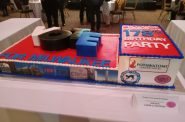Regulatory Woes Cost Baird $6+ Million
[Update: Tuesday, January 8th, 2008 — Baird was fined $200,000 today for overstating its volume of trades in 2006, or around the era written about in the post below.–Ed.]
This week Milwaukee-based Robert W. Baird & Co. was selected by Fortune Magazine as one of the “100 Best Companies to Work for 2007.” It was the fourth year in a row, and the second since it became an independent firm, that the investment firm had been selected for the distinction.
Although Baird, where “new hires often are greeted with flowers,” might be a Workers’ Paradise, it may not be nearly as idyllic for its retail customers, according to a http://www.milwaukeeworld.com/ investigation of regulatory documents.
They show Baird clients increasingly resorting to arbitration panels to resolve their differences with the firm, with allegations of “failure to supervise,” “breach of fiduciary duty,” and “negligence,” among other charges, being frequently decided in their favor. The numbers of complaints, the percentage of claims awarded against Baird and the size of the claims have risen dramatically under current management, and since the purchase of the firm by management and employees from The Northwestern Mutual Life Insurance Co. of Milwaukee in 2004.Of particular moment in the firm’s history was the arrival in 1994 of then-Chief Operating Officer Paul E. Purcell who brought his management team to Baird from the then-imploding Kidder Peabody & Co., where he had spent 22 years as head of the Midwest Investment Banking Group, based in Chicago. (Purcell’s brother Philip Purcell was then CEO of investment giant Morgan Stanley.) Never before had Milwaukee seemed so close to Wall Street.
Of social significance, especially to the Old Guard, Paul Purcell kept his distance from Milwaukee both figuratively and literally, commuting from his Illinois home to his office at 777 E. Wisconsin Avenue. However useful Purcell’s connection to New York, Chicago – and even international capital markets — his detachment from Milwaukee and his core clients appears to have come at a price of at least $6 million in regulatory awards against his firm since he took the helm.
Since Purcell took over as President and Chief Executive Officer of Baird in 2000 (he added the title of Chairman in 2006), the National Association of Securities Dealers [NASD], the Self Regulatory Organization [SRO] overseeing the securities industry has issued at least 27 awards against Baird in arbitration proceedings, with damages and relief totaling over $2.2 million. (Another 11 cases were dismissed without awards against Baird during that time.) The number of filings, awards, and the size of the awards are up greatly in the Purcell era, compared to a mere handful resolved in the decades preceding his arrival. It is believed that this report is the first look ever into Baird’s regulatory situation by any news medium.
New Money vs. Old Clients
Purcell’s mission was to enliven the company and to bring it into the 21st century. His “regime change,” as it was described, brought rapid changes to Baird. From 1996-2006, the firm saw 17% compound annual growth rate in its Asset Management division (institutional and high-net-worth individuals); 13% growth in its Capital Markets division (investment banking); yet only 9% growth in its Private Wealth management (individuals). In that period, revenue grew from $300 million to $651 million. Operating profits in 2005, the first full year of Baird’s complete independence from The Quiet Company, totaled $80 million.
The figures suggest the growth in big-money accounts came at the expense of attention paid to the slower-growing (and less-lucrative) individual investors who had been the mainstay of the firm since its founding in 1919 as a department of the First Wisconsin National Bank. This did not escape the attention of some long-term employees, their customers – and the regulators.
And Now, for the Awards
Among those who won awards from Baird were the wife of a prominent Milwaukee attorney; a Mequon doctor, and numerous elderly and retired clients.
The National Association of Securities Dealers awarded over $2,204,000 to these and other claimants for reasons including “mismanagement,” “unsuitability,” “failure to supervise,” “breach of fiduciary duty,” and “negligence” in the handling of customer accounts.
Additionally, the New York Stock Exchange made a $343,000 award in 2003 and another for $1,014,400 in 2004 to settle charges including misrepresentations, breach of fiduciary duty, breach of contract, negligence and gross negligence, recommendation of unsuitable investments, and negligent supervision of individual clients’ accounts.
The company’s recruitment methods also cost it $1,206,299 in a member-vs.-member complaint from a rival NASD member firm which asserted “unfair competition / raiding by Baird; conversion; breach of fiduciary duty …; tortious interference with contracts …; misappropriation of trade secrets and confidential information; unlawful conspiracy… and unjust enrichment.”
Perhaps the cost of a few million dollars in regulatory judgments paid to individual investors is a small price for a firm that has reached super-regional status, and claims to be one of the largest investment firms not based in New York, with aspirations to the highest ranks of corporate finance.It does seem to conflict with the firm’s description of its corporate culture, as found on its website:
“The foundation of any successful business is built upon a strong culture – on shared values of honesty, integrity, genuine concern for clients and respect for associates. Our Mission, Vision and Culture set forth the ideals we strive to put into practice every day. … Clients Come First … Integrity is Irreplaceable.” Or, as the firm’s annual report put it, “Great outcomes begin with trusted, objective advice.”
“Threats,” “Intimidation,” “Abused Trust” in 30-Year Business Relationship with Mrs. Hupy
Case 03-00559 was served against Baird and broker David S. Epstein on January 30th 2003 by Suzanne Spenner-Hupy, the wife of a prominent Milwaukee personal injury attorney. She accused Baird of “account-related negligence” in allowing a volatile stock [ADC Telecommunications] to balloon to nearly 50 per cent of her entire portfolio’s value before its precipitous decline decimated her profits.
According to claimant’s pre-arbitration statement:
“In permitting stock in ADC Telecommunications to balloon to nearly 50 percent of the value in her portfolio and then crash back to nearly nothing without capturing the gains, Epstein and Baird breached that trust and lost substantial assets belonging to Mrs. Hupy. Along the way, Epstein and Baird repeatedly assured Mrs. Hupy that they were looking out for her best interests. Yet when push came to shove, Mr. Epstein and Baird were more concerned about their own interests in maintaining the price of ADC Telecommunications stock, abused the trust generated during Mrs. Hupy’s nearly thirty-year relationship with Baird, and used threats and intimidation to get Mrs. Hupy to go along.”
Baird countered, saying Mrs. Hupy was engaged in “second guessing” based on “hindsight.” The arbitration board found in her favor and awarded her $100,000 on June 14th, 2004.
Client Burned by Volatile Equities
In case 04-03380, settled on April 28th, 2005, the claimant had made “investments in highly volatile … equities” at the recommendation of a Baird advisor. A $400,000 award was made in which the arbitrators found that Baird had engaged in “mismanagement, unsuitability, failure to supervise, breach of fiduciary duty and negligence” in the case.
“Unauthorized Transactions” in Retiree’s IRA Accounts
Case 05-03061 settled on May 31st, 2006 for $35,000 is relatively small by today’s Baird standards, but nonetheless disturbing: “Claimant(s) asserted the following causes of action: sale of unsuitable investments, negligence, misrepresentations and omissions, unauthorized transactions, failure to supervise, violations of the Michigan Securities Act, breach of contract, constructive fraud/breach of fiduciary duty, common law fraud, and excessive trading. The causes of action relate to unsuitable investment recommendations in claimants IRA accounts.
Claimants specifically alleged that the investments were grossly unsuitable given Mr. Boeve’s age, retirement status and actual investment objectives.”
$100,000 Relief Asked, $250,000 Granted in Most Recent Case
The most recent award against Baird has a “disposition date” of November 14th, 2006 for case 04-07238. In it, Kathleen B. Keenan asked for $100,000 in actual and compensatory damages, claiming “failure to supervise, fraudulent activity, breach of fiduciary duty, fraudulent activity—misrepresentation and fraudulent activity—churning against Baird in connection with trades for securities in her account. Among the issues mentioned: IPSCO, Raychem, Pennzoil and Guidant. Baird was ordered to pay her $250,000 in compensatory damages, and $100,000 in attorney’s fees.
Baird Shells Out for Botticelli
In case 01-03303 an award of $150,000 was paid to Dr. James Botticelli, a longtime Mequon doctor who “asserted the following causes of action: breach of fiduciary duty; breach of contract, failure to supervise, misrepresentation and negligence.”
It’s a Family Affair
In case 01-03440, the NASD arbitrators ruled:
“Respondents Robert W. Baird & Co., Inc. and M. David Epstein, jointly and severally, are found liable on the claims of negligent supervision, breach of fiduciary duty and violation of Florida Statutes, Chapter 517 and shall pay to Claimants compensatory damages of $417,099.00 to be paid as follows:
To Abraham & Shirley Bielski, Jointly $230,235.00
To Shirley Bielski $ 25,671.00
To Abraham Bielski $ 6,845.00
To David Bielski $ 52,831.00
To Natalie Bielski $101,517.00.”
A Note on Sources:
[Most complaints against Baird reported here were resolved in binding arbitration hearings operated by NASD in its capacity as a Self Regulatory Organization. They can be searched – with some difficulty – on the organization’s website. It helps to know some facts beforehand, so http://www.milwaukeeworld.com/ placed a request with NASD for the cases in which Baird was involved. Forty-six case summaries were returned, dating from 1989 to the present. This skeleton data was then entered into the website providing further information, including in some instances particular stocks involved and other data, including complainants’ names. However, the information provided in the various case files varies widely in degree and specificity. Although the arbitration process is quasi-judicial, the information available is far less than that which ordinarily would be found in a search of court documents. – Ed.]
This article was originally published by Milwaukee World.
Plenty of Horne
-
Villa Terrace Will Host 100 Events For 100th Anniversary, Charts Vision For Future
 Apr 6th, 2024 by Michael Horne
Apr 6th, 2024 by Michael Horne
-
Notables Attend City Birthday Party
 Jan 27th, 2024 by Michael Horne
Jan 27th, 2024 by Michael Horne
-
Will There Be a City Attorney Race?
 Nov 21st, 2023 by Michael Horne
Nov 21st, 2023 by Michael Horne





















